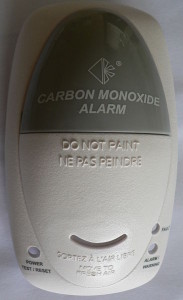Carbon monoxide is a deadly, odorless, and clear gas. Carbon monoxide poisoning claims lives in this country each year. Most often, poisoning occurs when people use fuel-burning appliances in the home – especially when those appliances are poorly maintained or defective. Carbon monoxide poisoning can also occur in homes with attached garages if proper precautions aren’t taken to keep car exhaust out. As our homes become more airtight and energy-efficient, experts say that carbon monoxide leaks can become more deadly, because there are fewer ways for the carbon monoxide escape.
Carbon monoxide poisoning often leads to feelings of drowsiness, fatigue, or disorientation. People may not be able to escape before they succumb. In many cases, they lose consciousness and if evacuation and medical attention don’t occur rapidly, fatalities are the result. Proper precautions as well as carbon monoxide detectors could help prevent many tragedies each year.
To keep your family safe, follow these steps:
1) Use caution with fuel-burning devices.
Devices such as gas water heaters, furnaces, gas fireplaces and other devices can all emit carbon monoxide and can be dangerous if they are not properly installed and maintained. Read the owner’s manual for any devices in your home to determine whether they pose a carbon monoxide risk. Any fuel-burning appliances and devices should be installed by qualified technicians and should be inspected annually by qualified technicians who can measure carbon monoxide levels and can help you determine whether your devices continue to be safe.
2) Install carbon monoxide detectors.
Look for good quality carbon monoxide alarms and install them on each level of your house as well as outside each bedroom in your home. Always follow the instructions when installing carbon monoxide detectors and test them regularly, following manufacturers’ directions.
3) If you have existing carbon monoxide detectors, test them now.
Carefully read the labels and instructions that come with your detectors to determine when they need to be replaced. Replace older carbon monoxide detectors by their best before date.
4) Know what to do if you suspect carbon monoxide poisoning.
If you suddenly start to feel ill while at home or if your carbon monoxide detector goes off, make sure that everyone in your family knows that they should leave the house immediately and contact the local fire station. Get medical attention immediately and wait for the all-clear before returning home.
5) Never use devices and appliances intended for the outdoors inside.
Grills and some power tools intended for outdoor use, for example, can emit dangerous toxins and carbon monoxide. Store these devices or appliances outside or in a shed or garage, not in the home.
If you or a loved one has been injured by carbon monoxide exposure because of a faulty fuel-burning appliance or because of a faulty carbon monoxide alarm, you may have a products liability claim. If you have been injured, contact the personal injury attorneys at Flaxman Law Group. Our offices in Hollywood, Homestead, and Miami are always open to those who have been injured and we are always happy to provide free accident consultations to new clients.
 Florida Injury Lawyer Blog
Florida Injury Lawyer Blog


